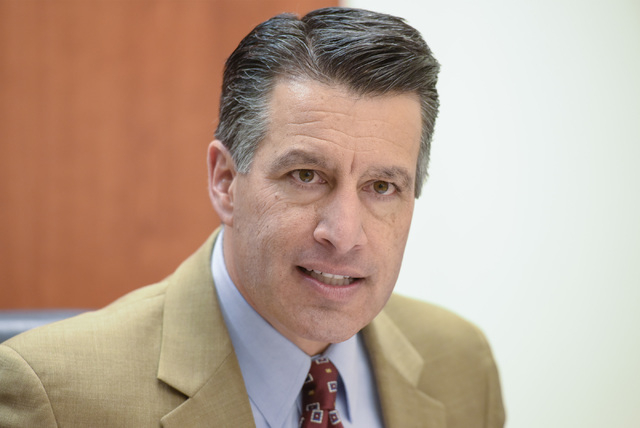EDITORIAL: Sandoval plan has our support — with a few suggested revisions
There are just seven weeks left in the 2015 Nevada Legislature. Lawmakers have made much progress in reviewing Gov. Brian Sandoval’s $7.3 billion, two-year budget, which includes about $800 million in new education spending. There is wide bipartisan support for the governor’s plan to improve Nevada’s inferior public education system: a mix of program expansions, new initiatives and policy reforms that will make schools more accountable for the billions of dollars they spend each year.
The challenge is how to pay for it. To accomplish that, the Legislature must authorize more than $1 billion in new taxes — taxes that will require two-thirds support in each chamber. Seven weeks isn’t much time to line up support for a plan that can meet the two-thirds threshold.
Gov. Sandoval’s tax plan is driving debate in Carson City. He proposes to make permanent the higher sales, motor vehicle and payroll tax rates that will expire June 30 and create a new annual state business license fee, ranging from $400 to $4 million based on a company’s gross revenue. Different industries would be subject to different tax rates in calculating that fee.
Gov. Sandoval has urged lawmakers and business leaders to try to come up with something better. So far, they haven’t.
That’s not to say the governor’s plan is perfect. It isn’t. No plan to remove $500 million per year from the private economy is, but some are worse than others. An ideal tax structure is simple, applied equally to all, is more voluntary than mandatory and does not encourage or discourage certain behaviors. The governor’s plan does not accomplish this, but neither do alternative plans proposed by lawmakers, which also seek to tax companies through a higher payroll tax, a gross receipts tax or some combination of levies.
The best option to come up with more money for education is off the table. Extending the sales tax to services would broaden the state’s tax base and allow lawmakers to reduce the rate, making it less regressive while taxing more voluntary commerce. But the state lacks the financial data to determine how to tax the service sector — everything from repair businesses to dry cleaners to lawyers. Lawmakers can’t project revenue from a services tax if they don’t know how much commerce service businesses generate. So Gov. Sandoval wants the state’s Taxation Department to start collecting that data from service companies.
As a result, an extension of the sales tax to services won’t get a look from lawmakers until 2017 at the soonest.
We support the governor’s budget and his vision. But we can’t offer that support without backing a way to pay for it.
We have reservations about Gov. Sandoval’s proposed business license fee. Foremost among them are the different rates for different industries, which invites a legal challenge to the levy if it passes. The tiered fees constitute tax “cliffs” that discourage business growth. The fee will make Nevada’s business climate less competitive just as the economy is recovering. And industries will spend the rest of time lobbying lawmakers to reduce their rates, or raise those of others. But discarding this plan and doubling the payroll tax, for example, wouldn’t make much difference in the bottom line of most businesses.
And so we offer our support for the governor’s business license fee, with a few recommended revisions:
— First, create an exemption for small businesses, as the payroll tax does. The state’s smallest businesses should pay a small, fixed license fee, and nothing more.
— Second, recover the revenue lost from those changes through Assembly Minority Leader Marilyn Kirkpatrick’s proposed reforms to the live entertainment tax, which would expand to reach nightclubs and other big-ticket events.
— Third, and most importantly, sunset the new business license fee on Dec. 31, 2017, with the intention of having the 2017 Legislature extend a reduced sales tax rate to services tax starting Jan. 1, 2018.
We know lawmakers have little interest in creating another temporary tax. Expiring tax rates were used by the Legislature in 2009 to get the state through the Great Recession. Then lawmakers passed new temporary extensions in 2011 and 2013. The climate in Carson City clearly favors permanency, but that’s the wrong approach if lawmakers pass flawed tax policy. They should use the business license fee as a bridge to 2017, when lawmakers will have the information they need to pass better tax policy.
Lastly, we recommend one significant change to Gov. Sandoval’s budget. We oppose expanding pre-kindergarten programs in public schools, especially in Clark County, which doesn’t have the classroom space to offer them and won’t be able to hire the teachers necessary to staff them. If early education classes lack excellent teachers, they become little more than child care. The failures of the federal Head Start program have proved as much. The school district will open the next school year short hundreds of licensed teachers — again. It will take at least two years to grow the programs necessary to recruit and train new teachers who can make early education programs work. We urge Gov. Sandoval and lawmakers to shift planned pre-kindergarten spending to UNLV’s proposed medical school, which must be fully funded to ensure its accredidation.
Gov. Sandoval’s budget and education plan deserve passage. Revenue with reform is the right vision for Nevada. Here’s hoping lawmakers get the funding details right, too.

















